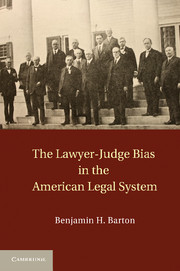Book contents
- Frontmatter
- Contents
- Acknowledgments
- 1 An Ambient Bias
- 2 The Theory
- 3 Constitutional Criminal Procedure
- 4 Civil Constitutional Law
- 5 A Short History of Lawyer Regulation
- 6 Current Lawyer Regulation
- 7 Torts
- 8 Evidence and Civil Procedure
- 9 The Business of Law
- 10 Enron's Sole Survivors
- 11 Complexity and the Lawyer–Judge Bias
- 12 Rays of Hope, Ramifications, and Possible Solutions
- Index
- References
9 - The Business of Law
Published online by Cambridge University Press: 03 May 2011
- Frontmatter
- Contents
- Acknowledgments
- 1 An Ambient Bias
- 2 The Theory
- 3 Constitutional Criminal Procedure
- 4 Civil Constitutional Law
- 5 A Short History of Lawyer Regulation
- 6 Current Lawyer Regulation
- 7 Torts
- 8 Evidence and Civil Procedure
- 9 The Business of Law
- 10 Enron's Sole Survivors
- 11 Complexity and the Lawyer–Judge Bias
- 12 Rays of Hope, Ramifications, and Possible Solutions
- Index
- References
Summary
Clients are not merchandise. Lawyers are not tradesmen. They have nothing to sell but personal service. An attempt, therefore, to barter in clients, would appear to be inconsistent with the best concepts of our professional status.
– Cohen v. Lord, Day & Lord[Dr. Raymundo] suggests that this case is different, because it involves the medical profession or that he is, somehow entitled to special treatment, because he is a physician and there is great need for his services. This self-serving position, however, cannot be upheld.
– Raymundo v. Hammond Clinic AssociationTHIS CHAPTER COVERS A SERIES OF COURT DECISIONS THAT affect the business side of law. Because lawyers care quite a bit about the bottom line as well as their conditions of employment, the lawyer–judge bias is quite prevalent in this area. It begins with the special rules that have been applied to legal services contracts and the special court-created rights lawyers have to collect debts from clients. Next, the chapter notes that state courts have not applied (or have only partially applied) consumer protection laws to the legal profession, despite the fact that the statutes do not explicitly exempt lawyers. Courts have likewise created different employment rules for lawyers. Lawyers are treated differently (and better) in cases dealing with noncompete agreements and when they are terminated for whistle-blowing.
- Type
- Chapter
- Information
- The Lawyer-Judge Bias in the American Legal System , pp. 209 - 242Publisher: Cambridge University PressPrint publication year: 2010

